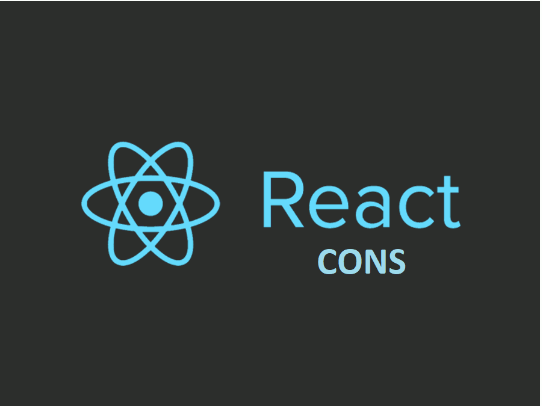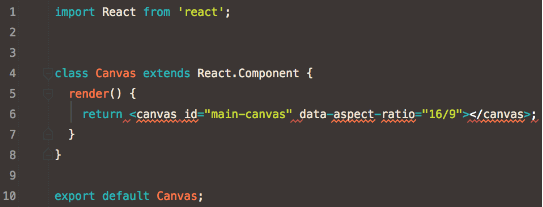The Pros and Cons of Using ReactJS

Every web app developer acknowledges ReactJS as an amazing JavaScript-based library for designing and creating single-page apps and UIs. When it comes to popularity, the library even beats Vue and Angular because of their efficiency and flexibility.
In fact, many leading tech companies like Netflix, Dropbox, and Salesforce, use ReactJS to power their apps. And as per Builtwith, there are around 11,046,998 live sites using React.
ReactJS is one of the most widely used open-source front-end JavaScript-based libraries that helps produce attractive UIs using several UI components. It is responsible for the view layer in web and mobile apps. ReactJS can boost productivity, reduce development time, lower web maintenance and development costs, and generate more standardized results.
However, just like other web app frameworks, there are a few pros and cons of using ReactJS. So, without further ado, here are the pros and cons of using ReactJS to help you better understand the library.
Pros of ReactJS

Simple and easy to learn
Compared to other JavaScript frameworks, ReactJS is much simpler and easy to learn. It features an adequate supply of training resources, tutorials, and other documentation. Developers who have a fair understanding of JavaScript will be able to understand and use ReactJS quickly within a few days.
Besides, hiring managers and business owners will find it much easier to recruit developers who have ReactJS knowledge and experience as the tool is easy-to-use. The fact that it’s easy to learn also benefits the developers who know ReactJS already.
However, since ReactJS is an ‘open-source’ library, development enhancements are constantly being introduced. Hence, developers are required to stay updated on the recent ReactJS improvements.
Makes it easy to make dynamic web apps

Earlier, making dynamic web apps using HTML strings was tricky as it required complex coding. However, ReactJS solves this issue and helps make dynamic web apps more accessible. It requires minimal coding and provides more functionality.
ReactJS uses JSX (JavaScript Extension), a syntax that writes XML-like or HTML text codes and renders specific subcomponents. Plus, it supports the creation of machine-recognizable codes as well.
Virtual DOM
The trouble with traditional or real DOM (Document Object Model) developments is that while processing changes, they tend to rewrite the complete DOM tree.
The present-day interactive apps and websites have large and complex DOM trees. And each time queries or inputs are introduced, the actual DOM needs to rewrite or modify the complete page, which can affect the performance.
Virtual DOM basically is nothing different than the virtual replica of the actual DOM. It performs faster, is efficient, and eventually produces a better UI. Rather than writing the complete DOM tree each time a modification is made, the Virtual DOM just changes the element that’s being manipulated.
Virtual DOM renders a dynamic, high-performing UI far better and faster than an actual DOM. In fact, it is one of the significant reasons ReactJS can develop high-performance UIs.

Reusable components
Writing the code for large-scale projects can be time-consuming. Conventionally, developers could not reuse the code components effectively as any changes to a component would directly affect the copy of that particular component elsewhere.
ReactJS isolates every component and allows you to reuse the design components effectively, saving development time and making your code more precise. With ReactJS, you no longer have to write code again for the same things. It enables you to reuse the components in your future projects.
Unidirectional data flow
Many JavaScript frameworks follow a multi-directional flow of data, which means that the data changed in the child element affects the data in the corresponding parent element. This issue increases the chances of an unstable code.
However, ReactJS solves this issue by following a downward data flow. Under this structure, the parent data is not affected by any changes in the child elements. That helps create a much more stable code, giving the developers better control over complex and large projects.
This feature is highly beneficial as it simplifies the flow of data entirely in the app or website, reducing the chances of errors and enhancing the debugging process.
Support of handy set of tools
Another reason for ReactJS’s popularity is the support of handy tools. Such tools make it easier for developers to create complex web apps. The ‘React Developer Tools’ are designed just like the Firefox and Chrome dev extensions, allowing you to detect the component hierarchies under Virtual DOM.
Moreover, it also helps you to choose specific components and evaluate their present state and props. With the help of ReactJS, the developers get access to UI widgets, a ready-made starter kit, modules to log in, and much more.
SEO-friendly

A higher rank in search engines is vital to the web development process. Websites and apps need to be more than just being functional. They should perform well under the search engine results page to grab the users’ attention and drive traffic. It is challenging for search engines to read JavaScript-heavy apps and websites.
ReactJS prevents this issue and makes search engines’ JavaScript-heavy apps and websites readable. That’s because ReactJS apps and websites can operate well on the internet server, while Virtual DOM renders and returns to the web browser as a usual web page.
That significantly affects the website or app’s performance by reducing the load time and enhancing rendering speed.
Scope for code testing
It is simple to test ReactJS apps. The library provides a scope to the developers where they can test the app and then debug the code by using native tools.
Community support
Though this isn’t a technical benefit of ReactJS, not listing it would seem incorrect. ReactJS has solid community support, mainly because it is an open-source library. Whether you encounter a bug, an error, or something else, we are pretty sure that the developer’s community will be there to assist you in any way possible. The stats justify this fact quite clearly- more than 1,15,000 developers have stated that they use ReactJS for web development, as per StackShare. That could likely be an understatement because, on GitHub, over 7.4mn users have admitted to utilizing ReactJS.
Cons of ReactJS

The rapid development pace
The rapid development pace has its pros and cons both. In terms of the con, since ReactJS is continually changing and evolving, a few developers find it challenging to stay up-to-date and constantly relearn the new mechanisms and processes.
However, in the case of pro, some developers see this pace of change as an advantage as the new developments in ReactJS introduce new features, making their job easier. Above all, it is vital to note that these advances and developments enhance ReactJS and help it perform better, at a much greater level.
Improper documentation
A significant reason for the improper documentation in ReactJS is the constant launch of new releases and updates. As ReactJS gets updated regularly and rapidly evolves, the developers don’t get ample time to write the complete documentation.
And as the developers don’t have enough time to complete the documentation process, they are left with just sparse resources and text guides, which do not cover proper details.
Incomplete toolset for development
ReactJS just covers the view layer of an app. Therefore, you still have to use a few other technologies or third-party extensions and libraries to have a complete toolset to develop the app.
JSX can be confusing to learn

Though JSX syntax makes the job of a developer a little easier, a few of them find it difficult and complex to learn. Many new developers find the JSX code as a barrier to understanding ReactJS. While that can be a disadvantage for some developers, it’s significant to know that JSX, though is optional, comes with its benefits too and assists in making the code clean and readable.
The Verdict
Considering all the pros and cons mentioned above, it wouldn’t be wrong to state that ReactJS is worth giving a shot. The library has a lot to offer and has already provided some great results. It is one of the most powerful and efficient mobile and web app development libraries.
The applications developed using ReactJS are faster, more robust, and have an appealing UI than the other development frameworks. However, to ensure that you use it to its full potential, you need to take into account all its upsides and downsides.
Wrapping Up
It is challenging to compare ReactJS with the other web frameworks as it is a library. But, going by the popularity and rankings, it is safe to say that despite it being different, ReactJS is still appreciated by developers for what it brings to the table.
ReactJS is the most preferred library of several developers in the web app development space. Though a few might find ReactJS’s development overwhelming, that does not affect its popularity amongst developers worldwide.
The biggest disadvantages of ReactJS are because of human preferences. However, in terms of output and performance, there aren’t any significant drawbacks to using ReactJS over other JavaScript frameworks.
So, if you are a developer, you can opt for ReactJS for your upcoming web app development project. But ensure that you know its pros and cons well before finalizing it for your project. And if you are a business owner looking for ReactJS developers for hire, these pointers will help you decide better what kind of project you should work on.
FAQs
When can I use ReactJS?
Facebook initially released ReactJS as a JavaScript-based library to build UIs for the web. However, it has advanced since that time. You can use React for a variety of purposes. You can use it for web development, web app development, mobile app development, virtual reality applications.
Does ReactJS require any additional setup?
You need to follow several processes to set up ReactJS. Besides installing the ReactJS library itself, you will have to install other packages and several configurations to get a proper ReactJS development environment.
Can I add ReactJS to an existing project?
Yes, you can add ReactJS to an existing project. Once you set up ReactJS in your system, you need to add the React-DOM and React script tags into the existing HTML code. You will also have to modify the JavaScript file comprising the component you’ve created using a script tag.
Next, place a ‘div tag’ with your component’s name as its ID at the spot where you want the ReactJS component to be placed, and you’ll be good to go.
How can I host ReactJS apps?
You can host ReactJS apps like any other web application. There are many options for you to select from. You could host your ReactJS app on Heroku, Netlify, Github Pages and several other platforms, as these are the most suited options for a static website. In the case of dynamic websites, you can consider Google Cloud, AWS, or Microsoft Azure.
Does ReactJS support migration?
Facebook has designed ReactJS in a way that it facilitates gradual migration. You can use just certain features of ReactJS while leaving out the rest. With time, you could incorporate more of its features into your codebase.
Renowned companies such as Netflix have migrated successfully from other JavaScript-based frameworks/libraries to ReactJS and are doing so well.



